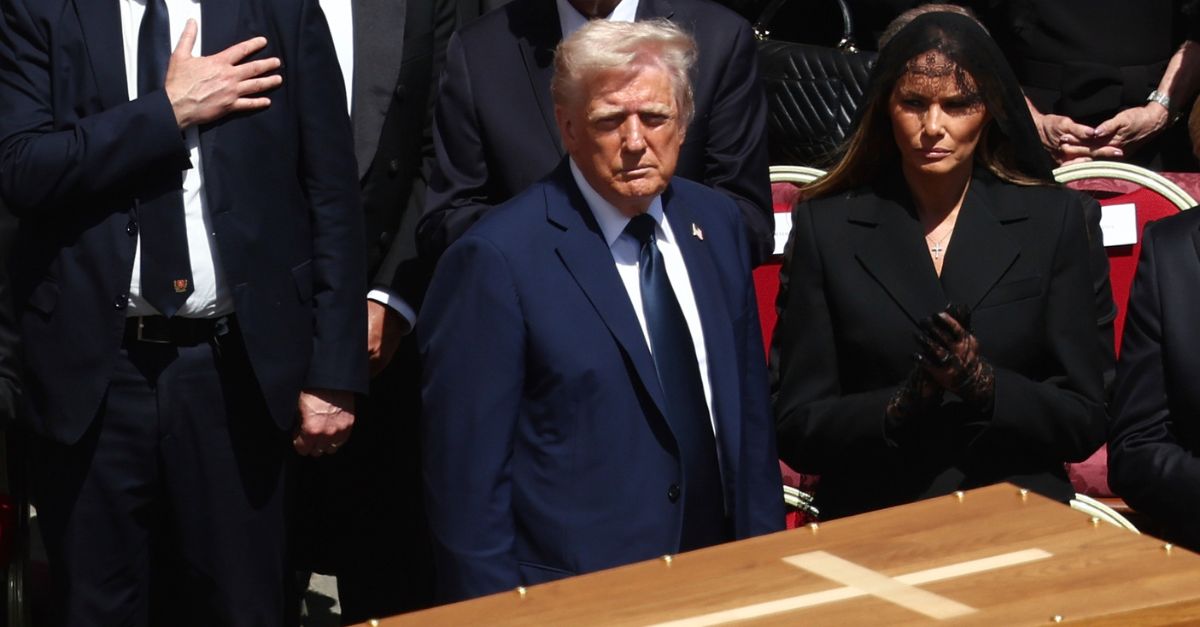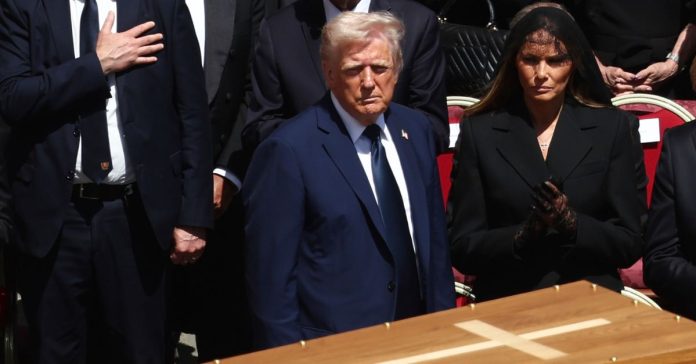
USA President Donald Trump and Melania Trump during the funeral ceremony of Pope Francis at Saint Peter”s Square in Vatican on April 26, 2025 (Photo by Jakub Porzycki/NurPhoto via AP).
The Trump administration secured a victory for the confidentiality of the confessional booth as a federal judge temporarily blocked a recently-enacted anti-child abuse statute in Washington state.
In a 25-page order, U.S. District Judge David G. Estudillo, a Joe Biden appointee, issued a preliminary injunction that keeps mandatory reporting legislation passed this year from going into effect. Absent the court’s order, SB 5375 would have become operative on July 27.
The law requires “any member of the clergy” who “has reasonable cause to believe that a child has suffered abuse or neglect” to “report such incident, or cause a report to be made, to the proper law enforcement agency.” This directive updates a pre-existing law that applies to a large swathe of job titles like social workers, school personnel, nurses, law enforcement officers, psychologists, and more.
The plaintiffs – led by Paul D. Etienne, the Roman Catholic Archbishop of Seattle – sued to enjoin the law in late May. Their 46-page original petition alleged a host of First Amendment violations – as well as violations of the 14th Amendment’s guarantee of equal protection. The U.S. Department of Justice joined the fray with a motion to intervene in late June, specifically challenging the law in terms of its application to information learned in the confessional booth.
On Friday, Estudillo sided with the plaintiffs – barring Washington from enforcing SB 5375 “as to the Sacrament of Confession against the Plaintiffs in this action and all Roman Catholic priests in Washington who fall directly under the administration of Plaintiffs.”
Love true crime? Sign up for our newsletter, The Law&Crime Docket, to get the latest real-life crime stories delivered right to your inbox.
The court found the plaintiffs’ basic claim – that the law violates the First Amendment’s free exercise clause – an easy call.
But such an analysis requires several steps.
Step one, the court found, was plain as Sunday.
“There is no question that SB 5375 burdens Plaintiffs’ free exercise of religion,” the order reads. “In situations where Plaintiffs hear confessions related to child abuse or neglect, SB 5375 places them in the position of either complying with the requirements of their faith or violating the law. In this way, the statute ‘affirmatively compels them, under threat of criminal sanction, to perform acts undeniably at odds with fundamental tenets of their religious beliefs.’ The consequences for violating the law are serious and, as Plaintiffs assert, the implications of violating the Sacramental Seal are more serious still.”
To hear the plaintiffs tell it, the law would have put them in the impossible of complying with the law that would risk criminal prosecution or violating a sacrosanct tenet of faith that would risk their excommunication from the Roman Catholic Church.
“As Plaintiff Etienne stated, any priest who directly violates the sacramental seal incurs automatic excommunication and thereby risks eternal damnation,” the order goes on.
Estudillo said the “key” merits question was whether the state’s obvious burden on religion was “neutral and generally applicable.”
And here, again, the court had little trouble finding an answer.
“SB 5375 modifies existing law solely to make members of the clergy mandatory reporters with respect to child abuse or neglect,” the order goes on. “However, other groups of adults who may learn about child abuse are not required to report. Parents and caregivers, for example, are not mandatory reporters.”
The court goes on to note the Evergreen State legislature, during the same session, passed a law providing mandatory reporting exceptions to “attorney higher education employees” and their subordinate staff. This law, the judge, acridly notes, is also set to go into effect on July 27 – the exact same day the law targeting clergy would have gone into effect.
“The government interest at issue in both statutes — protecting children from abuse and neglect — is the same,” Estudillo opines. “Nevertheless, one law eliminates the privilege for clergy while the other expands the privileges available to secular professionals.”
Notably, the judge says he could end his analysis on that point, but marshals one extra piece of evidence in the plaintiffs’ favor – going forward with another oft-used step in assessing a free exercise challenge.
Another section of SB 5375 – which Washington’s lawyers tried to disclaim as “superfluous” during a hearing – adds that: “Except for members of the clergy, no one shall be required to report under this section when he or she obtains the information solely as a result of a privileged communication.”
Still, the court found this section of the law telling.
“Here, clergy were explicitly singled out,” the order continues. “Defendants suggested that the law ‘doesn’t demonstrate legislative animus,’ but were unable to explain why the language in § 1(b) of the bill doubled down on singling out clergy when § 1(a) had already added clergy to the list of mandatory reporters who could not invoke a communication privilege.”
The court suggests, in fact, legislators knew they were targeting a deeply-sincere religious practice – and cites statements from a legislator critical of “religious communities” who choose to cover up child abuse.
“The targeted exception for clergy raises concerns, as the text of the bill and its legislative history arguably evince the intentional abrogation of a practice that the legislature understood to be religiously sacrosanct,” Estudillo muses.
The judge also draws a distinction between laws that intentionally target religion and those that incidentally burden religion.
“The fact pattern at hand is readily distinguishable from cases where courts have found that a law’s lack of religious exception does not necessarily give rise to a free exercise claim,” the court observes. “In this case, clergy were the only professionals whose pre-existing exception was eliminated by the legislature.”
Then came the final step.
Under long-standing ideas of constitutional analysis, the way a court approaches a question is often determinative, if not dispositive. Typically, this is understood in terms of how harshly any given court will scrutinize the government’s behavior. In the parlance of the U.S. Supreme Court, there are three major frameworks: rational basis review, intermediate scrutiny, and strict scrutiny.
In general terms, rational basis review often yields a win for the government; strict scrutiny often yields a loss for the government; while intermediate scrutiny is anyone’s guess.
Here, the court subjected SB 5375 to strict scrutiny – which, notably, is the typical framework for First Amendment religion challenges.
Ultimately, the court found, Washington’s focus on limiting the protection of the confessional booth by extracting communicative privileges while extending those same privileges to secular professionals proved fatal.
“The state, in removing the privileged communication exception for clergy but expanding it for other professionals, cannot demonstrate the narrow tailoring strict scrutiny requires,” Estudillo determines.

